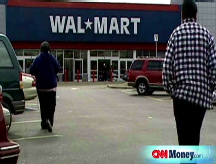Gas pains for shoppers, but...
Consumers may be pulling back as oil and food prices surge. But retailers with a focus on value, corporate customers and overseas markets are holding up well.

NEW YORK (CNNMoney.com) -- Rising food and gas prices are taking their toll on the American consumer. And many retailers, not surprisingly, are struggling as well.
But there are some bright spots in retail land...and that might be an encouraging sign for the U.S. economy.
Home improvement chains Home Depot (HD, Fortune 500) and Lowe's (LOW, Fortune 500) are really being hit hard since the woes in the housing market are also affecting them.
Home Depot reported a 66% drop in first-quarter earnings this morning and a slip in sales of nearly 4%.
"The housing and home improvement markets remained difficult in the first quarter; in fact, conditions worsened in many areas of the country," said Home Depot chairman and CEO Frank Blake in a statement this morning.
Home Depot's weak report comes one day after Lowe's reported a decline in earnings and sales. Lowe's also lowered its guidance for 2008.
Discount retailer Target (TGT, Fortune 500) is struggling too. Although the company reported this morning that sales rose 5% from a year ago, that was lower than what analysts were expecting. And profits fell from the same period last year.
In what has to be considered a massive understatement, Target CEO Gregg Steinhafel said in a statement that "the current economic environment remains challenging."
But it's not all doom and gloom for the retail sector.
Despite the bad news from Home Depot and Lowe's, it is probably premature to count out the American consumer. People may be spending less at those retailers but they may be just shifting to other stores, particularly those that have a heavy emphasis on value, instead.
Take Wal-Mart. The retail giant's first-quarter sales rose more than 10% while earnings increased nearly 7%. "Our business is even more relevant to our customers today, given the current economic pressures," said Wal-Mart (WMT, Fortune 500) CEO Lee Scott in the company's earnings release last week.
The company added in its statement that low prices helped boost sales "even in light of economic headwinds caused by higher energy costs and food inflation."
With that in mind, warehouse retailer BJ's Wholesale Club (BJ, Fortune 500), which competes with Wal-Mart's Sam's Club, is expected to post strong results when it reports earnings tomorrow morning. Analysts expect sales to increase 10% and profits to rise 40%
And I've spotted another interesting trend in this recent round of retail results: Businesses appear to still be following the mantra of shop 'til you drop.
Office products chain Staples (SPLS, Fortune 500) posted a small increase in profits and sales for the first quarter and the company reaffirmed its outlook for the year.
To be sure, Staples is benefiting from strong growth overseas -- international sales rose 19% from a year ago. While a big chunk of that was due to the weak dollar, sales abroad were still up a healthy 8% after excluding currency fluctuations.
But perhaps more noteworthy is the fact that Staples' North American delivery division, i.e. the unit that sells office products to small and mid-sized businesses, reported revenue growth of 8% in the quarter.
That could be interpreted as a sign that even though the average consumer is pulling back, Corporate America may still be healthy enough to continue spending.
To that end, this morning car parts retailer AutoZone (AZO, Fortune 500) reported it also saw strength from business customers. AutoZone's fiscal third-quarter sales and earnings were up from a year ago. This may seem odd at a time when gas is approaching $4 a gallon and the Big Three automakers are reporting dismal results.
But AutoZone's sales to commercial customers were up 6.3% in the quarter, compared to just a 1.5% increase in consumer retail sales.
So this downturn... which many are already referring to as a recession... is shaping up to be the opposite of the post tech-bubble recession in 2001. Back then, corporations cut back on expenditures while consumers, for the most part, kept spending.
This time around, businesses, many of which are flush, may continue to spend. And that may help the economy from plunging into a lengthy recession.
Of course, since consumer spending accounts for nearly two-thirds of the nation's economy, healthy business spending won't be able to completely offset a prolonged downturn in consumer spending.
Issue #1 - America's Money: All this week at noon ET, CNN explains how the weakening economy affects you. Full coverage.
Are you buried under a pile of debt and need help getting out? Did you recently manage to pull yourself out of debt and want to share your story? Tell us about your experience with debt and how the current credit crisis is affecting you.. Send us your photos and videos, or email us to share your story. ![]()



